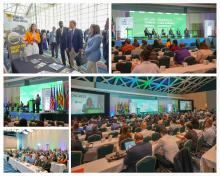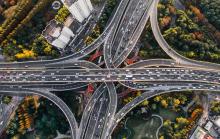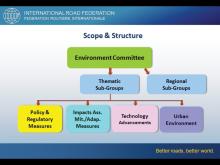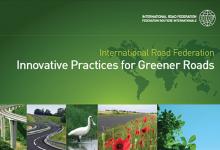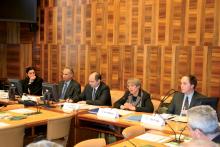Transportation industry stakeholders across sectors and technical experts from academia and international organisations examined these impacts of extreme weather events and how to better adapt to a changing climate at an UNCTAD meeting on "Climate Change Adaptation for International Transport: Preparing for the Future" held in Geneva, Switzerland, on 16 and 17 April. The International Road Federation (
"When it comes to climate change, transport is not just a culprit, but also a victim," said UNCTAD's chief of transport policy and legislation, Regina Asariotis. Though the transport sector is a contributor to climate emissions, it also faces severe risks resulting from impacts of climate change such as sea-level rise, soaring temperatures, extreme storms and floods.
We are suffering more extreme weather events as a result of climate change, warns the Intergovernmental Panel on Climate Change (IPCC) in its latest report, which calls for accurate climate information to support strategies for adaptation and mitigation.
The World Economic Forum's 2019 global risks report identifies extreme weather events, failure of climate change mitigation and adaptation, and natural disasters as the top three economic risks.
Growing risks for transportation
The risks to transportation, especially coastal transport infrastructure, threaten global trade and development. "Coastal risk is becoming one of the most threatening natural hazards, especially in low-income countries," said Michalis Vousdoukas, an expert from the European Commission Joint Research Centre, while presenting latest global projections on climate risks and multiple hazard exposure of transport infrastructure assets.
Damage, disruption and delays that may be caused by extreme weather events and climate change pose a huge economic risk to closely interlinked global supply chains, with significant repercussions for trade and development.
"Strategies for reducing vulnerabilities, enhancing resilience, and improving economic efficiency are necessary for sustaining economic and social gains," said Willard Phillips, economic affairs officer at the UN Commission for Latin America and the Caribbean.
Act now on climate adaptation. Benefits outweigh initial costs
Sustainable and resilient transport is a cross-cutting issue under the 17 Sustainable Development Goals set by the international community in 2015. It is key to the achievement of progress on several goals. But much international debate and action in relation to climate change and international transport has focused on addressing the causes (mitigation) rather than coping with the impacts (adaptation).
The unrelenting assault of climate change requires countries to develop strategies for resilient transport infrastructure and systems, various speakers at the meeting said.
"Despite the potential high initial costs of adaptation measures, their benefits often outweigh the costs, as several studies have found," said Ms. Susanna Zammataro, Director General at the International Road Federation (IRF). "In order to facilitate climate change adaptation, we need to work as supply chains rather than transport modes," said Michael Woods, principal operations specialist at the Rail Safety and Standards Board in the United Kingdom.
All stakeholders must work together
Solutions can only be found by all stakeholders working together," said John Lengel, who leads the Airports
Council International's adaptation work. underscoring the need to be more proactive in incorporating adaptation into the management and expansion of transport infrastructure.
“The IRF released in 2016 at the COP22 a Manifesto on Climate Change Adaptation - endorsed by IRF Members and a number of other key stakeholders from the sector - providing 13 comprehensive and constructive recommendations” said Susanna Zammataro.
Data will be key in this process. The establishment of databases on all transport assets, land use, the regional economy, weather and climate change should be a priority in every country, she added. "There is a need for adaptive policymaking, high-quality asset data, capacity-building, and incentives for the private sector to invest in adaptation," Ms. Zammataro said. She also urged the creation of an open-access global transport infrastructure database of adaptation-oriented policies, measures and projects.
The above recommendations and others made by experts at the meeting are expected to inform discussions at the UN Secretary-General's Climate Action Summit scheduled for 23 September at the UN headquarters in New York.


